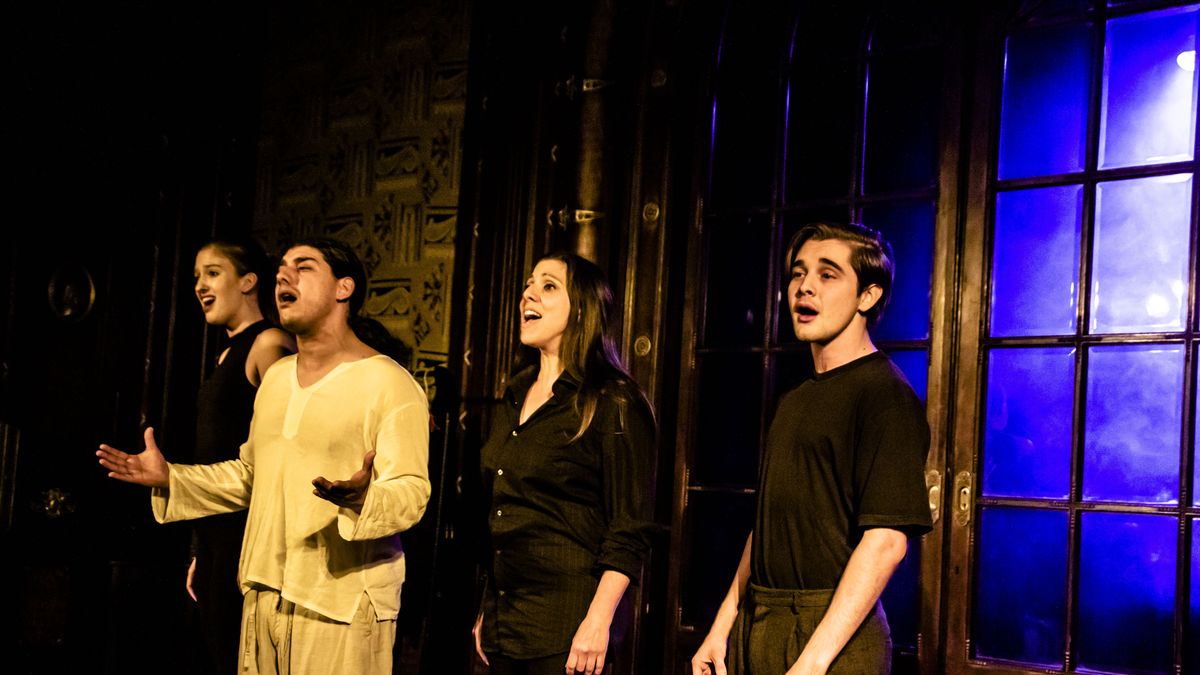“Everything regains meaning with the social situation of each era. These songs will sound today with maturity and the same feeling of that first time, when we premiered seven years ago,” says Nicolás Cúcaroone of the protagonists of the testimonial documentary “That is not sung”, that returns to the scene in three functions on September 5, 19 and 26 at the El Victorial Palace, Piedras 722.
The work was declared by the Legislature of the City of Buenos Aires “of interest for the promotion and defense of human rights” and won the Hugo prize to the “best coffee show”, “Best Actress” for Déborah Turza and “best actor” for Cúcaro Directed by Pablo Gorlerocomplete the cast Manuela Perin and Julián Rubino. Has the pianist on stage Juan Ignacio López.
Art always tried to prohibit or shut it up, but despite persecutions, deaths and censorship, poets never silenced. Many are gone, but their songs are still alive with them. “That is not sung” It is a documentary-testimonial musical that reviews those songs that were once prohibited, united by texts of writers and poets that were also censored. Since the time of World War II, through the Spanish Civil War, the North American Secession War, the convulsed 1968 and the Latin American military dictators anger “, among many others. It is time to remember them, to say them, to sing them to keep the memory alive.
We talked with Cúcarowho will also be part of a date in “Vichy incident”, The work of Arthur Miller which has been presented since June with localities exhausted in Callejón Espacio.
Journalist: What characters appear in the work that were prohibited or silent? Which ones evoke that, despite persecutions, deaths or censorship in the end they never managed to shut up?
Nicolás Chúcaro: The lady of the scarf, who embodies Deborah Turza, represents the wisdom and constant struggle against injustices; The hippie that Julián Rubino does, symbolizes freedom, the different in front of the norm; The student who makes up Manuela Perín represents the concern for constant knowledge and the struggle of all students over time; And the young revolutionary I do, represents active youth and hoping to change reality. We all form the people, the people who were and are quiet, we are people. Being a testimonial documentary, everything is crossed by music and poetry. We evoke great artists who were censored. Víctor Jara, Nacha, Favero, Moris, Mario Benedetti, Pedro and Pablo, etc.
Q.: The work travels World War II, through the Spanish Civil War, the North American Secession War, the French May and the Latin American military dictatorships. Which ones do you touch you the most?
NC: Those of here, the entire Argentine block is the one that most crosses me for a matter of closeness. What happens in the songs that walked the same streets that we walked today, we are part of that, of the struggle of the mothers, grandmothers, who are still standing. Listening to the CD is different from interpreting them actorrally, we get into history, we make meat, we are close to the pain suffered by those people. I do not conceive life without empathy. “I remind you Amanda” is one of the ones that move me the most, around Victor Jara.
Q.: “Oh, Carmela!”, “Bella Ciao”, “I remind you, Amanda”, “Strange Fruit”, “The Ballad of the Comodus viscach”, “Alicia’s song in the country” or “The march of the anger”, how do they resonate today?
NC: 7 years ago we premiered the work and 3 governments, the pandemic, and the songs sound and will always sound with that power. Everything regains meaning with the social situation of each era. In 2018 the country had borrowed the same ones that borrow us today, this time with more cruelty. They are songs that are going to sound with maturity and the same feeling of that first time, in the midst of struggle, militancy and faith, those condiments make them sound more strongly.
Q.: How do you see theater and culture today?
NC: Difficult since it is attacked, we try to get ahead to lung, the passion for this profession is it. The economic situation harms the theater, families cannot pay so many tickets so we strive to offer promotions and charge less, the numbers do not close for anyone. I see a culture beaten by power, just observe the Milo Jota in the former ESMA or Lali, which had its show delayed by a bomb threat. They bothers them that someone thinks differently.
Q.: What attracts you from “Vichy incident” of which you will be part of September 18? What can you say about this Miller classic?
NC: Gorlero contacted me to be part of the work that already has its time on the poster, it is an incredible text, all the actors are committed to the story that is told, Paul’s direction shows in this group of actors that touch perfection. I was attracted to aesthetics, text, composing a character that is on stage from the zero minute and goes towards the end, that is something that nobody wants to lose. It is a theme that challenges me, it is related to “that is not sung” because you want to disguise yourself, talk about “good people”, something that is not very different from “being a good Argentine” as it was said in the last time. There are phrases that suggest that we also fall into the trap. “They are not going to do that, they will not leave them” like the people who repeat that “Congress will not let them reach those limits.” I am happy to add on this date and hopefully in the future they leave more.
Source: Ambito
I am an author and journalist who has worked in the entertainment industry for over a decade. I currently work as a news editor at a major news website, and my focus is on covering the latest trends in entertainment. I also write occasional pieces for other outlets, and have authored two books about the entertainment industry.




